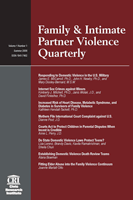Assessing and Addressing Intimate Partner Violence Knowledge Shortcomings in an Interdisciplinary Health Care Profession Student Population
Author: Simonne S. Nouer, M.D., Ph.D..; SeéTrail N. Mackey, M.C.J., M.P.A..; Nathan G. Tipton, M.A..; Pamela D. Connor, Ph.D..
Source: Volume 04, Number 04, Spring 2012 , pp.359-375(17)

< previous article |next article > |return to table of contents
Abstract:
Intimate partner violence (IPV) is a serious public health problem in the United States and worldwide, and continues to be one of the most common causes of physical injury and emotional trauma seen by health care providers. Although educators and national medical organizations have repeatedly emphasized consistent and comprehensive instruction on IPV intervention and prevention, the subject of IPV continues to be widely marginalized and peripherally placed in the curriculum. The authors of this piece explain, “Our study documented the IPV content exposure shortage in curricula of four health care disciplines (medicine, nursing, dentistry, and social work) at our institution [the University of Tennessee Health Science Center, Memphis, TN]. We determined prevalence of abuse among our student cohort and assessed IPV educational impacts by measuring increased recognition, improved prevention strategies, and enhanced practices that directly impacted care and treatment of IPV survivors. Our study findings will be used to support integration of ‘Healing Homes,’ an existing comprehensive family violence curriculum developed and pilot-tested by researchers at our institution in 2007, across disciplines at our institution. We believe that, from an interdisciplinary standpoint, curriculum integration is the most efficacious method of translating knowledge across disciplines, thus helping our students emphasize and disseminate IPV knowledge throughout their residencies and their chosen practice specialties. Moreover, we hypothesize that the interdisciplinary IPV education students will receive in their university classes and clinical rotations will further improve competence and help overcome knowledge gaps.”Keywords: IPV Survey for Healthcare Students, Physicians Readiness to Manage Intimate Partner Violence (PREMIS), Training Hours, Perceived Preparedness, Perceived Knowledge, Actual Knowledge
Affiliations:
1: University of Tennessee Health Science Center; 2: University of Tennessee Health Science Center; 3: University of Tennessee Health Science Center; 4: University of Tennessee Health Science Center.